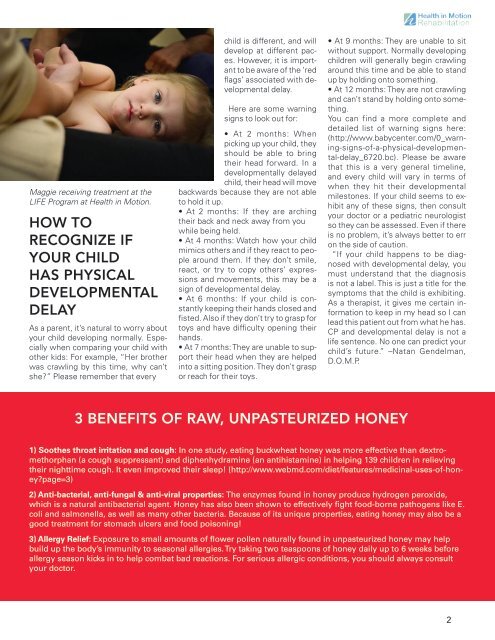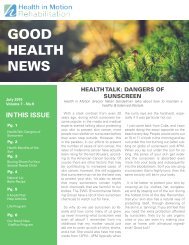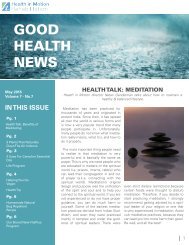GOOD HEALTH NEWS
Create successful ePaper yourself
Turn your PDF publications into a flip-book with our unique Google optimized e-Paper software.
Maggie receiving treatment at the<br />
LIFE Program at Health in Motion.<br />
HOW TO<br />
RECOGNIZE IF<br />
YOUR CHILD<br />
HAS PHYSICAL<br />
DEVELOPMENTAL<br />
DELAY<br />
As a parent, it’s natural to worry about<br />
your child developing normally. Especially<br />
when comparing your child with<br />
other kids: For example, “Her brother<br />
was crawling by this time, why can’t<br />
she?” Please remember that every<br />
child is different, and will<br />
develop at different paces.<br />
However, it is important<br />
to be aware of the ‘red<br />
flags’ associated with developmental<br />
delay.<br />
Here are some warning<br />
signs to look out for:<br />
• At 2 months: When<br />
picking up your child, they<br />
should be able to bring<br />
their head forward. In a<br />
developmentally delayed<br />
child, their head will move<br />
backwards because they are not able<br />
to hold it up.<br />
• At 2 months: If they are arching<br />
their back and neck away from you<br />
while being held.<br />
• At 4 months: Watch how your child<br />
mimics others and if they react to people<br />
around them. If they don’t smile,<br />
react, or try to copy others’ expressions<br />
and movements, this may be a<br />
sign of developmental delay.<br />
• At 6 months: If your child is constantly<br />
keeping their hands closed and<br />
fisted. Also if they don’t try to grasp for<br />
toys and have difficulty opening their<br />
hands.<br />
• At 7 months: They are unable to support<br />
their head when they are helped<br />
into a sitting position. They don’t grasp<br />
or reach for their toys.<br />
• At 9 months: They are unable to sit<br />
without support. Normally developing<br />
children will generally begin crawling<br />
around this time and be able to stand<br />
up by holding onto something.<br />
• At 12 months: They are not crawling<br />
and can’t stand by holding onto something.<br />
You can find a more complete and<br />
detailed list of warning signs here:<br />
(http://www.babycenter.com/0_warning-signs-of-a-physical-developmental-delay_6720.bc).<br />
Please be aware<br />
that this is a very general timeline,<br />
and every child will vary in terms of<br />
when they hit their developmental<br />
milestones. If your child seems to exhibit<br />
any of these signs, then consult<br />
your doctor or a pediatric neurologist<br />
so they can be assessed. Even if there<br />
is no problem, it’s always better to err<br />
on the side of caution.<br />
“If your child happens to be diagnosed<br />
with developmental delay, you<br />
must understand that the diagnosis<br />
is not a label. This is just a title for the<br />
symptoms that the child is exhibiting.<br />
As a therapist, it gives me certain information<br />
to keep in my head so I can<br />
lead this patient out from what he has.<br />
CP and developmental delay is not a<br />
life sentence. No one can predict your<br />
child’s future.” –Natan Gendelman,<br />
D.O.M.P.<br />
3 BENEFITS OF RAW, UNPASTEURIZED HONEY<br />
1) Soothes throat irritation and cough: In one study, eating buckwheat honey was more effective than dextromethorphan<br />
(a cough suppressant) and diphenhydramine (an antihistamine) in helping 139 children in relieving<br />
their nighttime cough. It even improved their sleep! (http://www.webmd.com/diet/features/medicinal-uses-of-honey?page=3)<br />
2) Anti-bacterial, anti-fungal & anti-viral properties: The enzymes found in honey produce hydrogen peroxide,<br />
which is a natural antibacterial agent. Honey has also been shown to effectively fight food-borne pathogens like E.<br />
coli and salmonella, as well as many other bacteria. Because of its unique properties, eating honey may also be a<br />
good treatment for stomach ulcers and food poisoning!<br />
3) Allergy Relief: Exposure to small amounts of flower pollen naturally found in unpasteurized honey may help<br />
build up the body’s immunity to seasonal allergies. Try taking two teaspoons of honey daily up to 6 weeks before<br />
allergy season kicks in to help combat bad reactions. For serious allergic conditions, you should always consult<br />
your doctor.<br />
2










